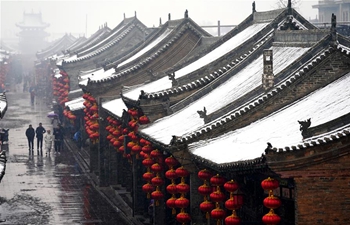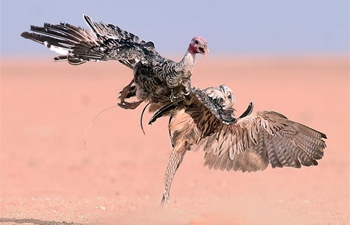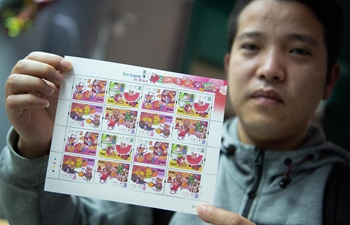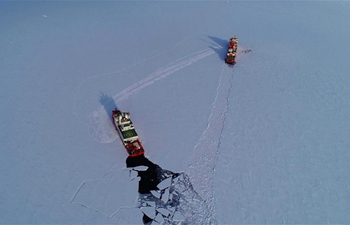The latest confrontation between Tehran and Washington on Friday, which led to the killing of Qassem Soleimani, commander of the Quds Force of Iran's Islamic Revolution Guards Corps (IRGC), has nurtured a risk that could lead to a war.
Here is a chronology of events related to the tension between the two countries.
On Dec. 29, the U.S. military launched deadly airstrikes on three locations in Iraq and two in Syria controlled by the Iraqi paramilitary group of Kata'ib Hezbollah, a group allied with Iran, in response to the killing of a U.S. civilian contractor in a rocket attack on its military base in Iraq.
Iran's supreme leader strongly condemned the deadly U.S. airstrikes in Iraq, calling it an "evil act of America."
Following the airstrikes, when the U.S. embassy was raided by the supporters of the Kata'ib Hezbollah, the United States held Iran "fully responsible" for the offense, which was dismissed by Iran who called it a "genuine" reaction by the Iraqis.
In July 2019, the U.S. navy announced that it had downed an Iranian drone in the Strait of Hormuz after the drone approached a U.S. Navy ship.
In June, Iran announced downing a U.S. Global Hawk drone in the Strait of Hormuz for "violating its sea borders." The Iranian move was followed by the U.S. "cyberattack on the IRGC and Iran's missile systems and imposing new sanctions on Iranian Supreme Leader Ayatollah Ali Khamenei and top Iranian military commanders."
In May, the United States deployed B-52 nuclear-capable bombers and additional Patriot missile batteries to the Middle East in an attempt it claimed to "deter Iran from possible attacks on U.S. troops in Iraq and Syria."
In the same month, the U.S. defense officials blamed Iran for a rocket attack on Baghdad's Green Zone in Iraq, which made U.S. government to evacuate employees from Iraq. Iran categorically denied the U.S. allegations.
The deprivation of Iran from its oil revenues, which is the lifeblood of Iran's economy, put Iran in a dire condition. Iran threatened to seal the Hormuz waterway for other beneficiaries if it cannot sell its oil.
After a number of suspicious attacks on the oil vessels in the Gulf and the Sea of Oman in June and a raid on the Saudi Aramco facilities in September last year, the U.S. stepped up its military presence in the region, deployed an additional 2,500 troops to the Middle East, and called for a coalition to secure the shipping lane.
The United States and Saudi Arabia accused Iran of being behind attacks on Saudi oil facilities. Iran denied its involvement in it, but the attacks were claimed by Yemen's Iran-backed Houthi militants.
In April 2019, the United States designated Iran's IRGC as a terrorist organization, which prompted Iran to retaliate and name U.S. troops in Middle East as terrorists.
After U.S. withdrawal from the Iranian 2015 nuclear deal in May 2018, Trump administration sought a strategy of maximum pressure campaign to force Iran to the negotiating table for a renewed nuclear deal and the curb of its controversial missile program, which Tehran has rejected.
In response to the U.S. move of quitting the nuclear deal and imposing old and new economic and banking sanctions, Iran has started to reduce its commitments to the accord in a staged manner, namely to exceed the agreed caps on its stockpiles of low-grade enriched uranium, to start relevant research and development activities, and to surpass the allowable level of purity.
Iran also threatened to do more if its economic interests are not secured under the deal.
A man sets up a poster of senior Iranian commander Qasem Soleimani in downtown Tehran, Iran, on Jan. 5, 2020. The latest confrontation between Tehran and Washington on Jan. 3, which led to the killing of Qassem Soleimani, commander of the Quds Force of Iran's Islamic Revolution Guards Corps (IRGC), has nurtured a risk that could lead to a war. (Photo by Ahmad Halabisaz/Xinhua)
?
A man walks past a poster of senior Iranian commander Qasem Soleimani in downtown Tehran, Iran, on Jan. 5, 2020. The latest confrontation between Tehran and Washington on Jan. 3, which led to the killing of Qassem Soleimani, commander of the Quds Force of Iran's Islamic Revolution Guards Corps (IRGC), has nurtured a risk that could lead to a war. (Photo by Ahmad Halabisaz/Xinhua)















